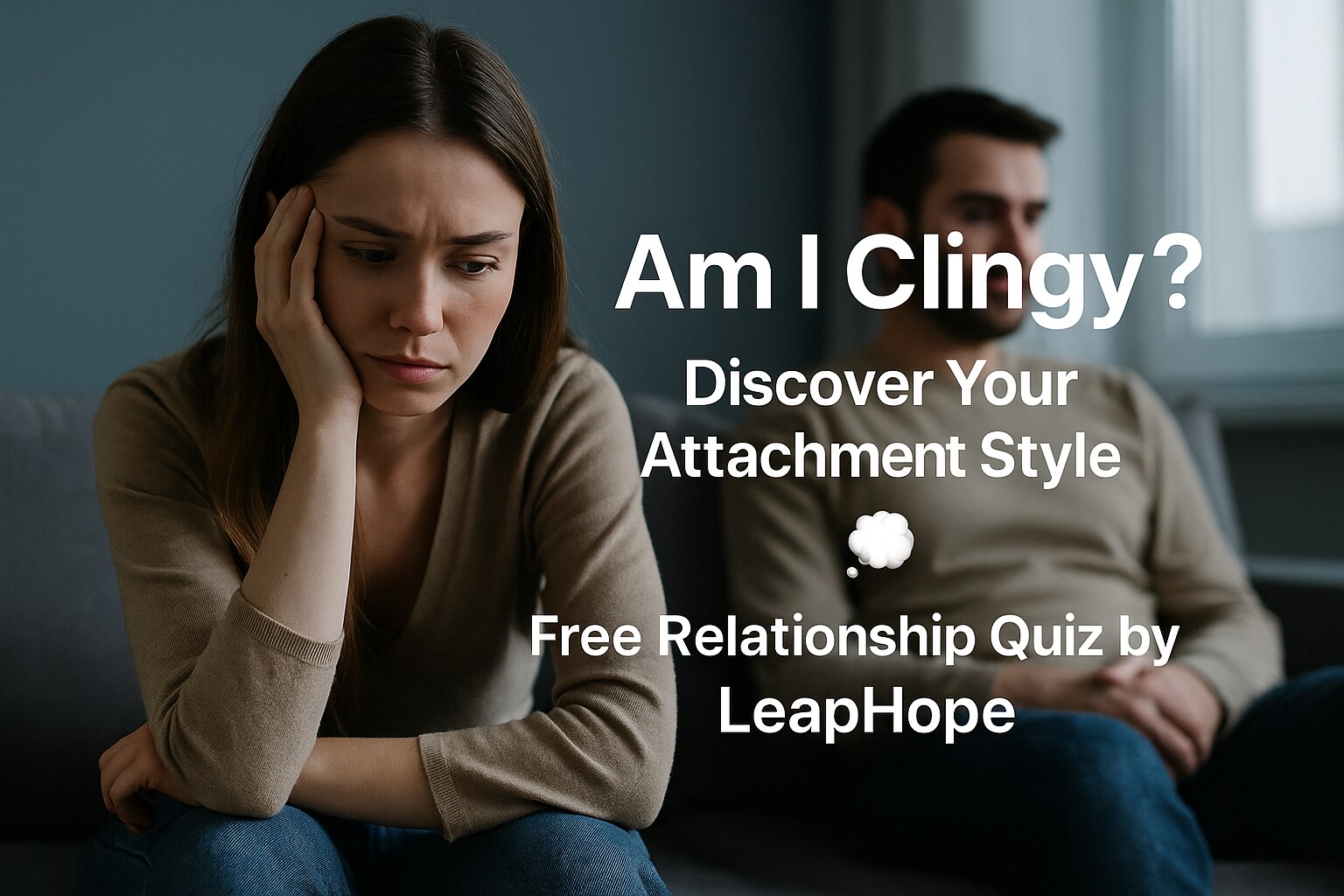Am I Clingy? Take the Free Relationship Attachment Quiz
Do you sometimes worry about being too clingy or too emotionally attached in love?
This gentle, psychology-based relationship attachment quiz helps you understand your connection style
and how you build closeness in relationships.
There’s no judgment here, only insight. You’ll explore how you express affection, handle emotional distance,
and what your patterns reveal about your emotional needs and boundaries.
Discover if your attachment style leans toward secure, anxious, or reassurance-seeking closeness.
Free, private, and created by LeapHope relationship therapists
How This Clinginess Quiz Works
This Am I Clingy Quiz helps you understand your emotional attachment patterns and the way you connect with people you care about. It focuses on emotional awareness rather than labels, helping you explore how much reassurance or closeness you naturally seek in relationships.
You’ll answer a series of thoughtful, relationship-based questions that uncover whether your attachment style leans toward security, reassurance-seeking, or emotional dependence. Each response gives insight into how you handle space, boundaries, and connection. There are no right or wrong answers, only self-discovery.
Created by LeapHope relationship therapists, this quiz is designed to bring gentle clarity to how you express love, ask for comfort, and manage emotional closeness. It’s a short, reflective tool to help you find balance between connection and independence.

Understand your emotional attachment style, Free Quiz by LeapHope
Am I Clingy? Free Relationship Attachment Quiz
Do you often overthink texts, crave constant reassurance, or feel uneasy when your partner takes space? This quiz helps you explore your attachment pattern and discover whether your love feels secure, balanced, or a bit too clingy.
For self-reflection only. Not a substitute for professional therapy.
Takes about 4–5 minutes
Understanding Your “Am I Clingy” Quiz Result
Feeling clingy or anxious in relationships doesn’t mean you’re broken, it means you care deeply and want emotional safety. This section explains what your quiz result means and how you can create a healthier balance between closeness and independence. Every attachment style can grow more secure with awareness, boundaries, and gentle self-trust.
You crave reassurance and closeness because love feels safer when it’s constant. You might text first, overthink replies, or feel uneasy when your partner seems distant. These patterns come from a deep desire for connection, not neediness. You simply want to feel secure in love.
Clinginess often develops from anxious attachment, where emotional distance feels like danger. The goal isn’t to suppress affection but to rebuild trust in yourself. When you know you’re enough, space doesn’t feel like rejection, it becomes rest.
Tip: Pause before reacting to anxiety. Ground yourself before reaching out, and communicate your needs calmly instead of assuming the worst. Healthy love isn’t constant contact, it’s constant care, even in silence.
You appreciate both closeness and independence in relationships. You might occasionally feel anxious when things change, but you usually find your way back to calm. You know that space doesn’t mean disconnection, and reassurance doesn’t mean weakness.
This balance often comes from self-awareness and emotional intelligence. You’re learning to express love without fear and give space without resentment. It’s a healthy foundation for long-term, emotionally secure relationships.
Tip: Keep practising open communication and emotional check-ins. Balance isn’t fixed, it grows with honesty, empathy, and shared trust. When you handle small insecurities gently, deeper intimacy naturally follows.
You feel confident in love without needing constant reassurance. You trust both your partner and yourself, allowing space, growth, and emotional freedom. This is known as a secure attachment style, the healthiest and most stable way to love.
Even if you once struggled with anxiety or overthinking, your ability to stay calm through uncertainty shows emotional maturity. You build connection through trust, not control. You believe love doesn’t require chasing, it flows naturally when both people feel safe.
Tip: Keep modelling this steady energy. Support your partner with patience if they’re more anxious. Security spreads, your calmness becomes their comfort, and together you build a peaceful kind of love.
Why Understanding Clinginess Matters in Relationships
Many people quietly ask themselves, “Am I too clingy?” but what they’re truly feeling is a fear of losing connection. Understanding your >attachment behaviour helps you see that clinginess isn’t a weakness; it’s a signal from your emotions asking for safety. By learning how your attachment style shapes your reactions, you can build secure and balanced relationships where love feels calm, not anxious.
In modern relationships, emotional security matters as much as attraction. When that sense of safety feels uncertain, it’s natural to seek reassurance through messages, attention, or closeness. Recognising these emotional triggers allows you to respond with self-awareness instead of guilt. You can also explore how this connects with your Love Language Quiz to understand how you express affection and what kind of care helps you feel secure.
Some people label clinginess as “needy,” but in truth, it often reflects anxious attachment a fear of emotional distance, not a lack of love. The key lies in balancing closeness with independence. You can read about the science behind this in Attachment Theory, a psychological model that explains how early experiences influence adult connection. Understanding your attachment type allows you to communicate more clearly, trust more deeply, and form secure relationships that feel both loving and free.
Whether you identify as emotionally dependent, balanced, or secure, awareness is the first step toward growth. When you understand your emotional patterns, you can create love that feels safe and steady. Continue exploring relationship psychology with our free resources on Love Language Quiz, Sexual Personality Quiz, and more expert insights at LeapHope, your trusted space for mental health, relationships, and emotional wellness.
